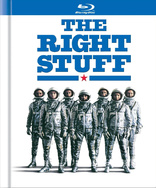The Right Stuff Blu-ray Movie
HomeThe Right Stuff Blu-ray Movie 
30th Anniversary EditionWarner Bros. | 1983 | 193 min | Rated PG | Nov 05, 2013
Movie rating
8.3 | / 10 |
Blu-ray rating
| Users | 4.6 | |
| Reviewer | 4.5 | |
| Overall | 4.6 |
Overview
The Right Stuff (1983)
The original U.S. Mercury 7 astronauts and their macho, seat-of-the-pants approach to the space program.
Starring: Sam Shepard, Scott Glenn, Ed Harris, Dennis Quaid, Fred WardDirector: Philip Kaufman
| History | Uncertain |
| Drama | Uncertain |
| Adventure | Uncertain |
Specifications
Video
Video codec: MPEG-4 AVC
Video resolution: 1080p
Aspect ratio: 1.78:1
Original aspect ratio: 1.85:1
Audio
English: Dolby TrueHD 5.1 (48kHz, 16-bit)
French: Dolby Digital 5.1 (640 kbps)
German: Dolby Digital 5.1 (640 kbps)
Italian: Dolby Digital 5.1 (640 kbps)
Spanish: Dolby Digital 5.1 (640 kbps)
Spanish: Dolby Digital Mono
Portuguese: Dolby Digital Mono
Japanese: Dolby Digital Mono
Japanese is hidden
Subtitles
English SDH, French, German SDH, Italian SDH, Japanese, Portuguese, Spanish
Discs
50GB Blu-ray Disc
Two-disc set (1 BD, 1 DVD)
Playback
Region free
Review
Rating summary
| Movie | 5.0 | |
| Video | 4.5 | |
| Audio | 5.0 | |
| Extras | 4.0 | |
| Overall | 4.5 |
The Right Stuff Blu-ray Movie Review
Let Me Play Among the Stars
Reviewed by Michael Reuben November 4, 2013Philip Kaufman's majestic The Right Stuff was not a success when it was released in 1983, but it continues to garner new fans as successive generations discover its unique blend of epic inspiration and relatable human drama. No other film has given us such earth-bound all-American heroes, then sent them rocketing into space to become legends. And Kaufman's film has the extra benefit of being (with a few allowances for poetic license) almost entirely true. The source was author Tom Wolfe's 1979 book of the same name, one of Wolfe's most successful non-fiction publications, which lionized the military test pilots who competed with each other during the post-war years to achieve increasingly faster speeds and created the mold for the famous Mercury Seven astronauts, selected and trained on a crash course to catch up with the Soviets after their successful launch of Sputnik. Wolfe's timing couldn't have been better. The Right Stuff was published at the end of a decade in which American confidence had taken one blow after another both domestically and internationally. The reminder of a time, not so long ago, when the world was held spellbound before its TV screens by the exploits of true-blue heroes trained by NASA was a comforting reassurance, especially when filtered through Wolfe's energetic prose. The most plausible theory for the film's lack of success four years later is that it had the misfortune to become intertwined in the public mind with the presidential campaign of former Mercury Seven astronaut, and now Ohio Senator, John Glenn. (He lost the nomination to former Vice President Walter Mondale, who was trounced by President Reagan in the general election.) Audiences avoided Kaufman's film as if it were a civics lesson, instead of flocking to it like the stirring adventure saga that viewers have been discovering ever since. With any luck, even more will discover it now on this superior Blu-ray presentation from Warner Home Video.
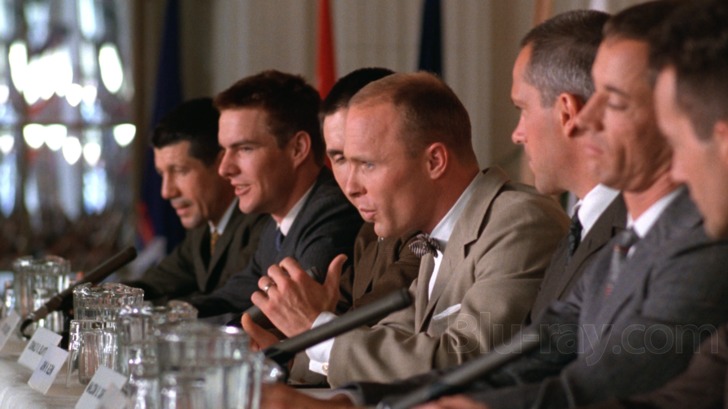
The animating spirit of The Right Stuff is Chuck Yeager (Sam Shepard), the Air Force test pilot who first broke the sound barrier on October 14, 1947. That momentous event is the first of many triumphs portrayed with edge-of-your-seat immediacy in The Right Stuff, and the depiction is as authentic as anyone could make it, because Yeager served as technical advisor to the film (and appears in a cameo). Sam Shepard doesn't resemble Yeager physically, but his laconic, authoritative performance, which was nominated for an Oscar, captures the indefinable quality embodied by the phrase "the right stuff". When another test pilot, Slick Goodlin (William Russ), demands $150,000 from the manufacturers of the experimental X-1 aircraft to fly it past Mach 1, Yeager volunteers to do so for free. He figures the Air Force is already paying him to fly, and exploration interests him more than money. Over the next ten years, Yeager's base of operations, originally known as Muroc Army Air Field and later renamed Edwards Air Force Base, becomes the favored destination for the best and the brightest among test pilots. The risky nature of their work is symbolized by the Happy Bottom Riding Club run by Pancho Barnes (Kim Stanley in her last film), a tin shanty of a saloon where the wall behind the bar is filled with pictures of test pilots who have died on the job. The wives of these daredevils, typified by Glennis Yeager (Barbara Hershey), struggle daily with the emotional turmoil of being married to men who voluntarily risk their lives in the pursuit of ever-greater airspeed. When President Eisenhower establishes NASA in response to the Soviet Sputnik launch, he insists that future astronauts be recruited from the ranks of test pilots, and a grueling process of physical and mental testing begins. Ironically, and in what many would come to regard as a serious mistake, Yeager is not included in the pool of candidates, because he lacks a college degree. From today's perspective, the testing process is both comical and occasionally grotesque, but NASA was inventing it as they went along. No one knew for sure what conditions an astronaut would encounter; so they subjected candidates to every imaginable form of physical stress. Only the toughest (and luckiest) remained. Throughout the sequences at Edwards and the extensive testing, Kaufman gradually acquaints us with the seven men who will ultimately be introduced to the public at a massive press conference on April 10, 1959. "Gordo" Cooper (Dennis Quaid) is a charmer with an irrepressible grin whose marriage to Trudy (Pamela Reed) will suffer the most from the strains of the job. Alan Shepard (Scott Glenn), who shares with Yeager a quiet confidence, will be the one chosen for the first Mercury mission. Gus Grissom (Fred Ward) will fly the second mission but will emerge under a cloud because of problems with his landing. (Though it is outside the scope of the film, Grissom would later die in a tragic accident during testing of the Apollo 1 spacecraft.) Less time is spent with Scott Carpenter (Charles Frank), Wally Schirra (Lance Henriksen) and Deke Slayton (Scott Paulin), simply because one film can only juggle so many characters. The standout among the Mercury Seven, in the film as he was in life, is John Glenn (Ed Harris), a charismatic personality with an instinct for the camera that emerges almost immediately at the Mercury Seven press conference. As the first American to orbit the Earth, Glenn became a national hero, but perhaps his most heroically crowd-pleasing moment in The Right Stuff is when he stands up to Vice President Lyndon Johnson (Donald Moffat), his NASA program director (John P. Ryan) and the entire press corps to insist that his reluctant wife, Annie (Mary Jo Deschanel), be left alone. When the program director threatens to replace Glenn on the mission if he doesn't back down, the other six Mercury astronauts provide a vivid demonstration of just what a cohesive team the Mercury Seven had become. One of the most surprising features for first-time viewers is just how funny The Right Stuff is, because it's so often described in terms of patriotic solemnity. Tom Wolfe's use of humor was essential to his popularity as a writer, and both Kaufman's script and direction for The Right Stuff took care to find cinematic equivalents. Kaufman cast Jeff Goldbum (the tall one) and Harry Shearer (the short one) as a pair of mismatched NASA recruiters whose deadpan delivery would be right at home on the vaudeville stage. Shearer's narration of a newsreel compilation of circus performers who he thinks would be likely candidates as astronauts (they're used to heights, speed and fire—and they're available) could be a skit on Saturday Night Live. To portray the press corps, Kaufman hired members of Fratelli Bologna, a San Francisco comedy theater troupe, who turn the press's crazy scrambles into a kind of Keystone Cops ballet. And, of course, there's the constant ribbing among the pilots and the astronauts, who may present a unified front to the outside world, but in private are constantly trying to outshine each other. Because The Right Stuff depicts the beginning of the space program, Kaufman and effects supervisor Gary Gutierrez elected not to create their flight sequences using then state-of-the-art techniques seen in films like Star Wars and Outland. Instead, as Kaufman later said, "we tried new techniques and old ones, often jerry-built. Sometimes we hurled models out of windows and filmed them on their way down." The result has a rough-hewn authenticity that blends well with the documentary scenes culled from thousands of feet of newsreel footage collected by the editing team from all over the world. The film concludes with Gordo Cooper's flight on May 15, 1963, the last solo American space mission and the conclusion of the Mercury program. As Levon Helm's narration relates, for that moment Cooper "went higher, farther, and faster than any other American", but if The Right Stuff demonstrates nothing else, it shows that someone else will always follow to continue "pushing the envelope", as long as the collective spirit of the country is behind them, as it so clearly was during the Mercury and Apollo programs.
The Right Stuff Blu-ray Movie, Video Quality 
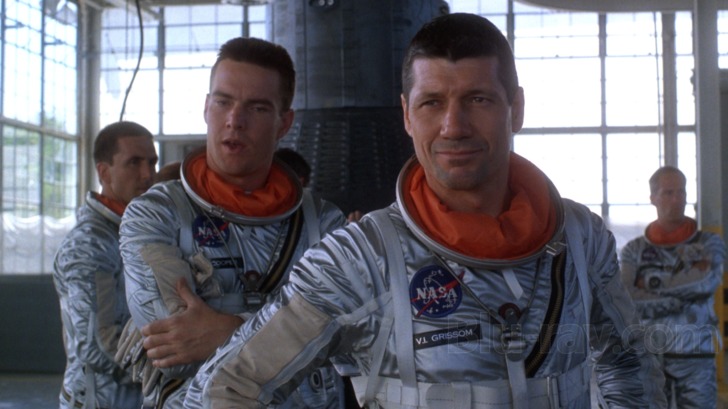
The Right Stuff's cinematographer, Caleb Deschanel (The Passion of the Christ), faced the challenge of recreating a period look spanning the late Forties to the early Sixties, then blending it with both existing documentary footage and effects sequences using both models and full-size mockups. His work was nominated for an Oscar, one the film's eight nominations. (It won for editing, sound, sound effects editing and score.) Warner's 1080p, AVC-encoded Blu-ray offers a pleasingly film-like image that is consistently detailed, fine-grained and colorful with a widely varying palette. The browns and yellows of the desert country surrounding Edwards Air Force Base contrast with the whites and blues of the various NASA facilities—the old mechanical style vs. the new scientific method, so to speak—and the various domestic situations have their own low-key styles, usually darkened, as if to express that these places don't get the full measure of the men's attention. The space flight sequences are often rough and grainier than the rest of the film, which helps them match with the archival footage and lends a feeling of authenticity, especially for anyone who remembers watching these events on TV. The image may appear soft to eyes accustomed to contemporary digital sharpness, but the detail is readily apparent in any scene that doesn't involve opticals. Black levels and contrast appear to be accurate, and there is no sign of inappropriate digital manipulation in the form of high frequency filtering or artificial sharpening. The average bitrate of 22.49 Mbps is not surprising for a 193-minute film, and it appears to be adequate to avoid compression-related issues.
The Right Stuff Blu-ray Movie, Audio Quality 
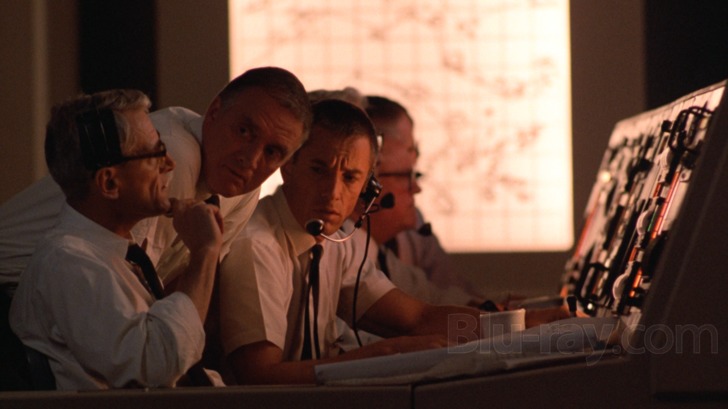
The Right Stuff was released in both Dolby Stereo and a six-track mix for 70mm blow-ups. Presumably the six-track mix was the basis for the 5.1 remix featured on Warner's 2003 DVD and presented here as lossless Dolby TrueHD. The film's Oscar-winning sound mix and sound editing are very much in evidence in the numerous flight sequences, each of which has its own character in keeping with the different aircraft, courses, weather conditions and all the particulars of each specific endeavor. Subtler sounds, like the hum of activity in Mission Control or the snake-like hiss of the press corps (with their cameras winding and clicking) or the constant wind blowing around Pancho's bar, don't always register consciously, but they're essential to the film's sonic texture. Bill Conti, who replaced composer John Barry at the last minute, won an Oscar for his energetic score, which captures the can-do spirit of the pilots and astronauts without indulging in an excess of patriotic fervor. The score on this Blu-ray track sounds warmer and more present than I can ever remember hearing it. The dialogue is always clear, even accounting for regional accents (including Donald Moffat's ripe impersonation of LBJ's Texas twang).
The Right Stuff Blu-ray Movie, Special Features and Extras 
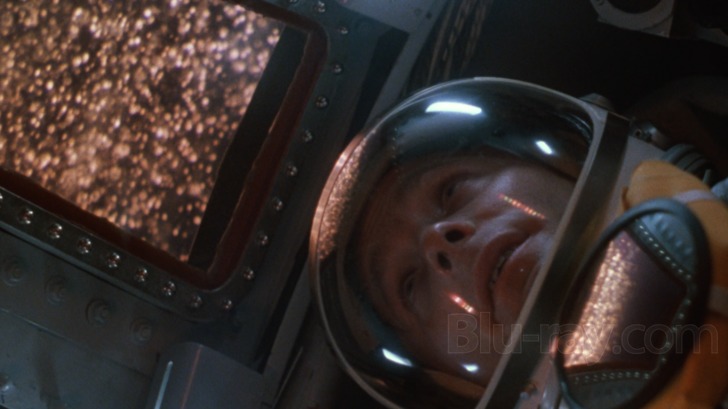
All of the extras are contained on a separate DVD included as a second disc. According to owners of the two-disc special edition DVD released by Warner in 2003, the DVD is identical to the second disc of that set.
- Commentary with Selected Scenes
- The Cast (24:29): Participants include Quaid, Ward, Reed, Cartwright, Moffat, Goldblum and Shearer.
- The Filmmakers (24:29): Participants include Kaufman, Chartoff, Winkler, Deschanel and Conti.
- Documentaries
- Realizing the Right Stuff (21:05): Made in 2003 for the 2005 DVD, this documentary traces the development of the film from the first interest expressed by producers Robert Chartoff and Irwin Winkler in Tom Wolfe's book through completion. This first portion takes the account through the end of principal photography.
- T-20 Years and Counting (11:28): The second portion of the documentary focuses on visual effects and release.
- The Real Men with the Right Stuff (15:30): This is a historical documentary using archival footage and interviews with Tom Wolfe, Chuck Yeager, Scott Carpenter, Gordon Cooper and Wally Schirra.
- Deleted Scenes (10:54): The scenes are not separately listed, but there are thirteen. None are especially noteworthy.
- Interactive Timeline to Space: A graphical listing of key events in the history of American space travel from 1961 through 2012. Clicking on each event in the timeline plays an excerpt of NASA footage with narration by Levon Helm.
- John Glenn: American Hero (1:26:31): This 1998 PBS documentary chronicles Glenn's return to space at the age of 77.
- Theatrical Trailer (3:33).
- Digibook: The illustrated digibook contains extensive notes on the production, as well as biographical notes on the principal cast and director Kaufman and excerpts from Wolfe's book.
- Letter from director Philip Kaufman: An insert to the digibook contains a letter from the director recalling the challenges of making the film and thanking his many collaborators.
The Right Stuff Blu-ray Movie, Overall Score and Recommendation 
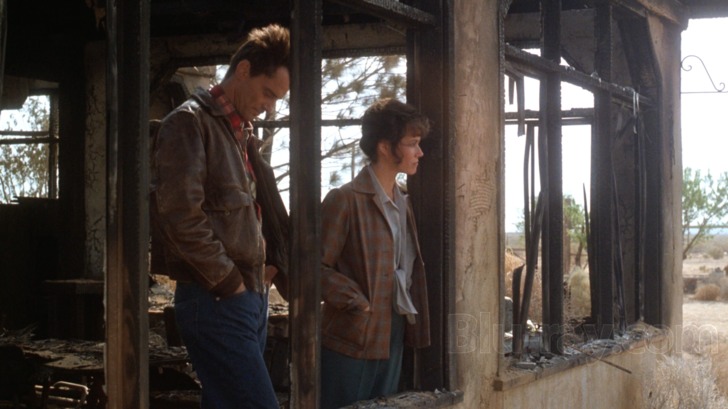
The Right Stuff is one of the 20th Century's great films, not only because the subject is important, but also because it is richly entertaining—a prime example of how to combine intimate drama with epic scale. Tom Wolfe was reportedly dissatisfied with the film because of its emphasis on Chuck Yeager, but Kaufman was only continuing what Wolfe started when he reclaimed Yeager as a spiritual forefather of the space program. As John Glenn suggested at the press conference where he and his fellow Mercury astronauts were introduced to the public, all flyers share a common lineage that traces back to the Wright Brothers. But some carry the same adventurous spirit that impels them to challenge the limits of what's possible, and over a twenty-year period, those are the ones who got us past the sound barrier, up into orbit and eventually to the moon. Highly recommended.
Other editions
The Right Stuff: Other Editions

The Right Stuff
1983

The Right Stuff
Corrected Version | 30th Anniversary Edition
1983

The Right Stuff
30th Anniversary Edition
1983
Similar titles
Similar titles you might also like

From the Earth to the Moon
1998

Thirteen Days
2000

Bridge of Spies
2015

Apollo 13 4K
1995

First Man 4K
2018

Good Night, and Good Luck.
2005

Judgment at Nuremberg
1961

K-19: The Widowmaker 4K
Collector's Edition
2002

Hidden Figures
2016

Reds
40th Anniversary Edition
1981

Munich
2005

1492: Conquest of Paradise
1992

World Trade Center 4K
2006

The Good Shepherd
2006

Sons of Liberty
2015

Killing Kennedy
2013

The Promise
2016

The Command
2018

The 300 Spartans
Fox Studio Classics
1962

Oppenheimer 4K
2023
